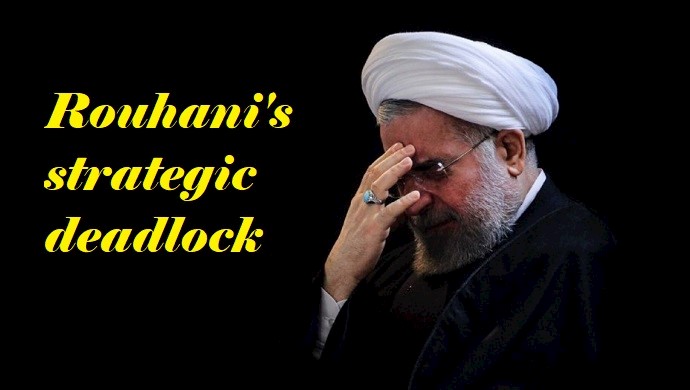Reporting by PMOI/MEK
Iran, October 18, 2019—“We are in a tough economic situation,” Iranian regime president Hassan Rouhani said during a speech he delivered at the Tehran University on Wednesday on the occasion of the new academic year. Rouhani’s remarks, which also touched on other topics such as the inner fighting between Iranian authorities, were admitted to the crises and his own exasperation in finding a solution to keep his regime afloat.
“Despite years of discussion, we haven’t been able to find a solution to our strategic problems,” Rouahni said, referring to the rivalries and disputes between different regime factions on policymaking issues. “If we can’t reach a solution, then we should opt for a referendum and ask the people. We can't keep on fighting among ourselves. We have been discussing this for 40 years and it’s time to choose a path.”
As is he won't, Rouhani tried to take advantage of the situation to endear himself with the people and portray himself as a moderate figure who promotes dialog and listening to the people. Ironically, while he was delivering his speech, a group of Tehran University students were protesting in front of the campus mosque and demanding the release of jailed students.
October 16 – Tehran University students protesting a visit by regime President Hassan Rouhani and demanding the release of jailed classmates.#Iran pic.twitter.com/OeUlYCQen8
— People's Mojahedin Organization of Iran (PMOI/MEK) (@Mojahedineng) October 16, 2019
But what’s important is that Rouhani is clearly admitting that his regime is in a deadlock and can’t find a way out. In his comments, Rouhani also stressed that the Iranian supreme leader’s purported plan to strengthen the national economy, the so-called “resistance economy,” will not work under the current circumstances.
“They say that, economically, we should stand on our own feet… Without any relations with the world, and while our banks and exports are locked down, we will have no development,” Rouhani said.
Rouhani also admitted to his defeat in saving his regime through the nuclear deal with world powers, formally known as the Joint Comprehensive Plan of Action (JCPOA). “The dispute isn’t about the JCPOA. It’s about something bigger,” he said.
The “bigger” thing that Rouhani referred to was the entirety of his regime, which has been founded on the fundamentalist ideology of Ruhollah Khomeini, a regime that, through 40 years of rule, has achieved nothing but murder, corruption, poverty, and unemployment for its people.
The regime’s various factions and officials constantly quarrel over which strategy will help preserve their corrupt rule. But the reality is that their time is up and it’s time for their regime to be overthrown in its entirety and be replaced with a democratic state. This is the “big dispute” that Rouhani is now confessing to.
Before his death in 1989, Khomeini had dreamed of creating an “Islamic State” by occupying the countries of the region. His successor, Ali Khamenei, stayed true to the teachings of Khomeini and spent the next decades exporting terrorism and fundamentalism to neighboring countries.
In 2003, Mrs. Maryam Rajavi, president-elect of the National Council of Resistance of Iran (NCRI), warned that the Iranian regime’s export of terrorism and meddling in neighboring countries is a hundred times more dangerous than its nuclear threat.
"The policy of appeasement is the flip side of the coin of hostility towards the Iranian Resistance. For four decades, this policy has enabled the mullahs to commit countless crimes and transgressions with impunity."#FreeIran#IStandWithMaryamRajavihttps://t.co/vzv5TkzCzs
— People's Mojahedin Organization of Iran (PMOI/MEK) (@Mojahedineng) June 29, 2019
Until recently, western countries effectively turned a blind eye on the warmongering and belligerent behavior of the Iranian regime because they pursued a policy of appeasement toward the mullahs. During these years, Rouhani, who is now portraying himself as a moderate figure, occupied important security and military posts and was actively involved in the regime’s destructive regional policies.
But now that the tides have changed, Rouhani has been desperately vouching for dialog and negotiations with the U.S., or the “Great Satan” as the mullahs say. In a press conference on Monday, Rouhani, who had previously boasted that he would not be negotiating with the U.S., declared his preparedness to “sacrifice” himself for his regime. Javad Zarif, his foreign minister, followed suit and echoed his comments.
While Zarif and Rouhani are desperately seeking ways to extend the life of their regime for a few more months, what they don’t understand is that their regime does not have the capacity to negotiate and interact with other states like a respected member of the international community.
As Khamenei said during an Iftar meeting in May, “We must consider that in dealing with the enemy, we only have two paths: resistance or retreat. America will do all it through economic pressure to, first, force our authorities into surrender, and second, to create a confrontation between the people and the establishment.”
In a nutshell, what this means is that the regime has only two choices, and both choices will lead to its destruction. But what Khamenei didn't admit to was that there's no need for a foreign intervention to put his regime at odds with the people. That confrontation already exists, and the people of Iran are regularly shouting "death to the dictator" in the streets, calling for an end to his tyrannical regime.





